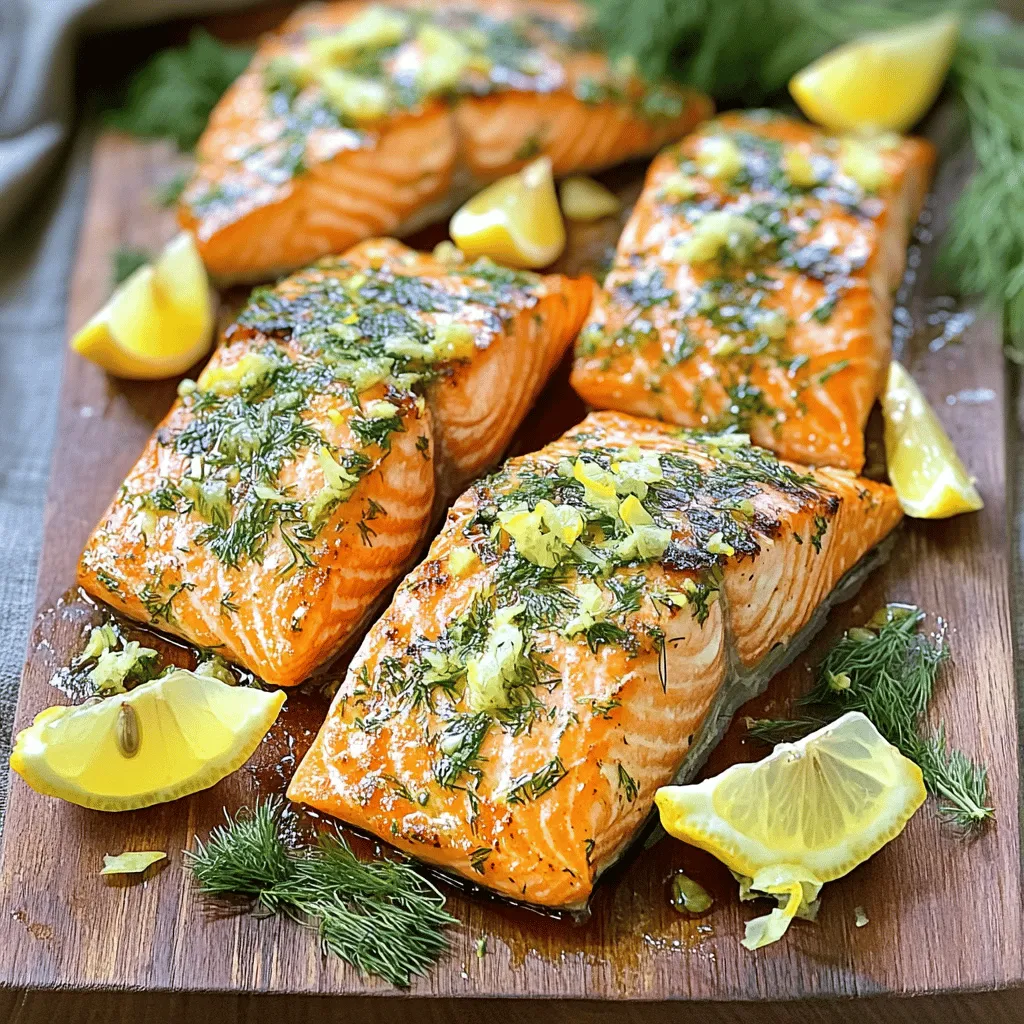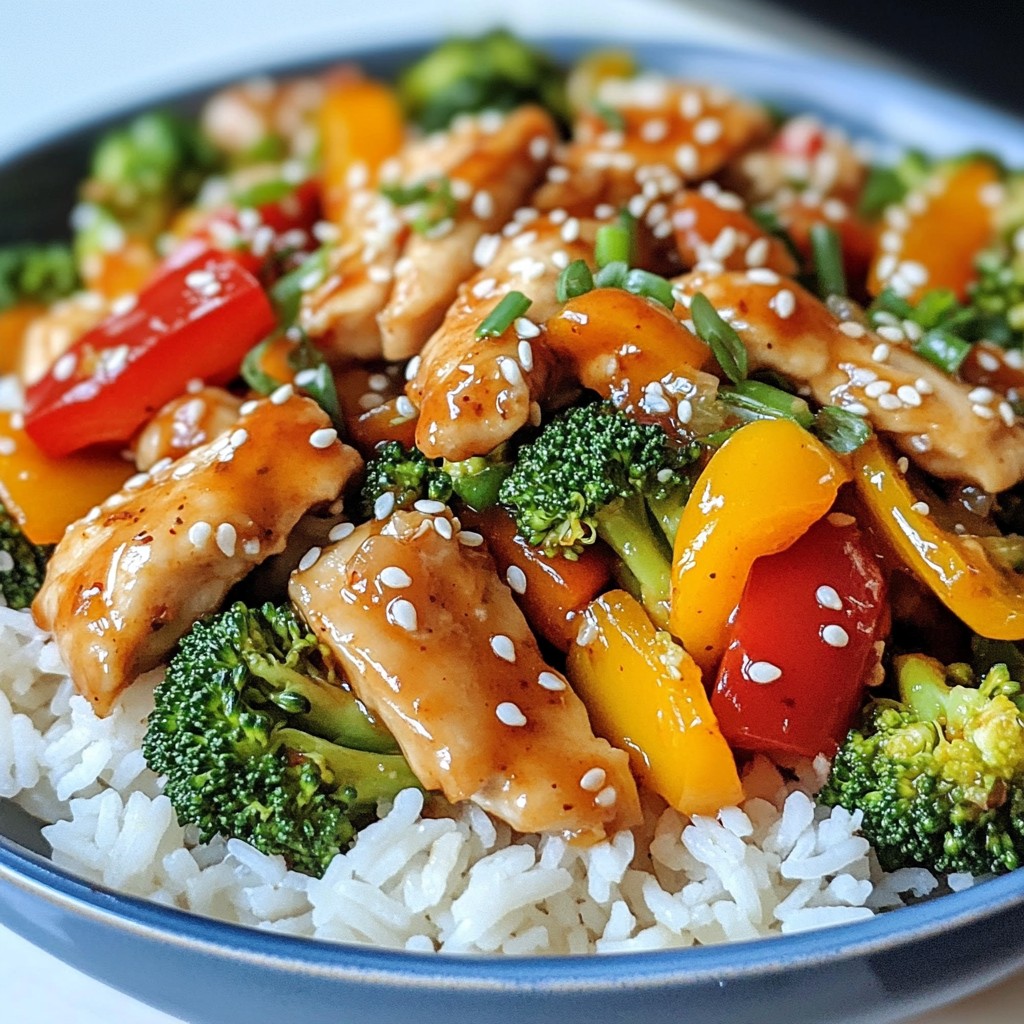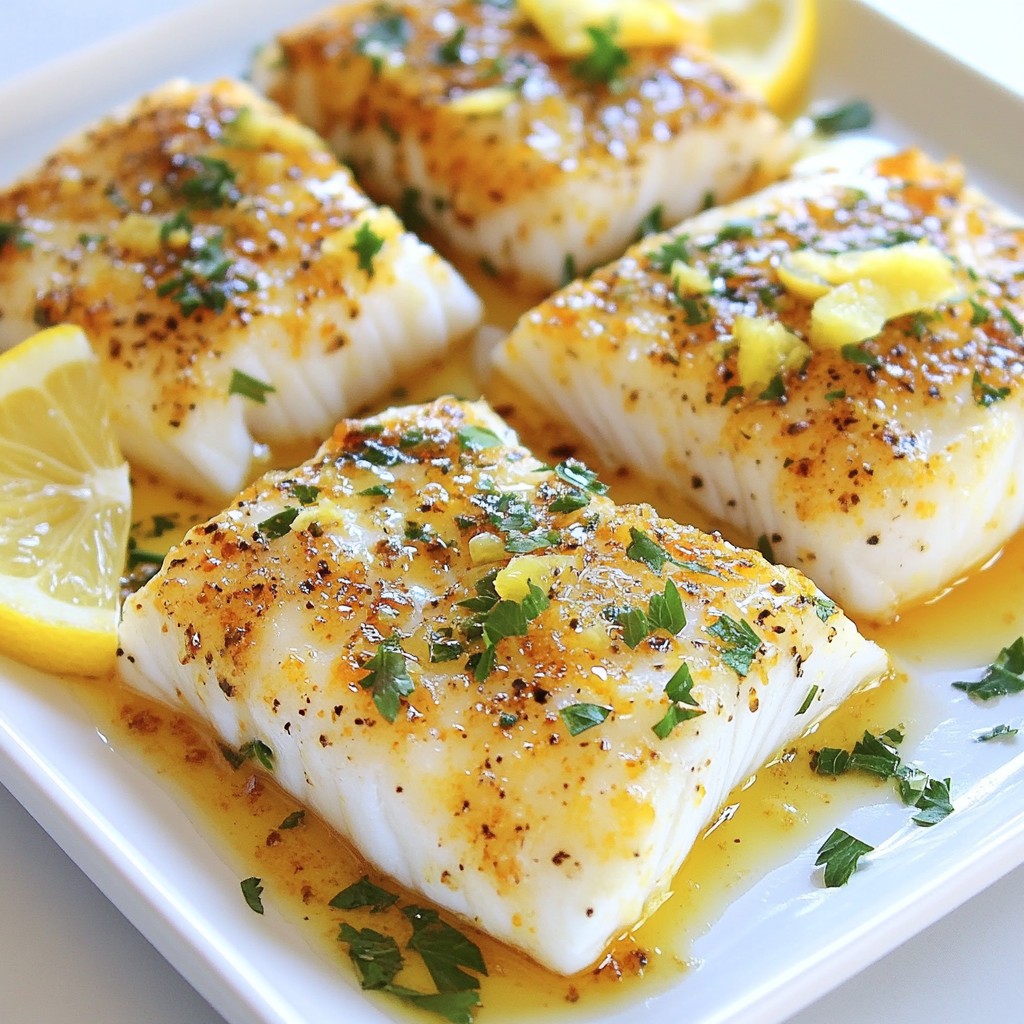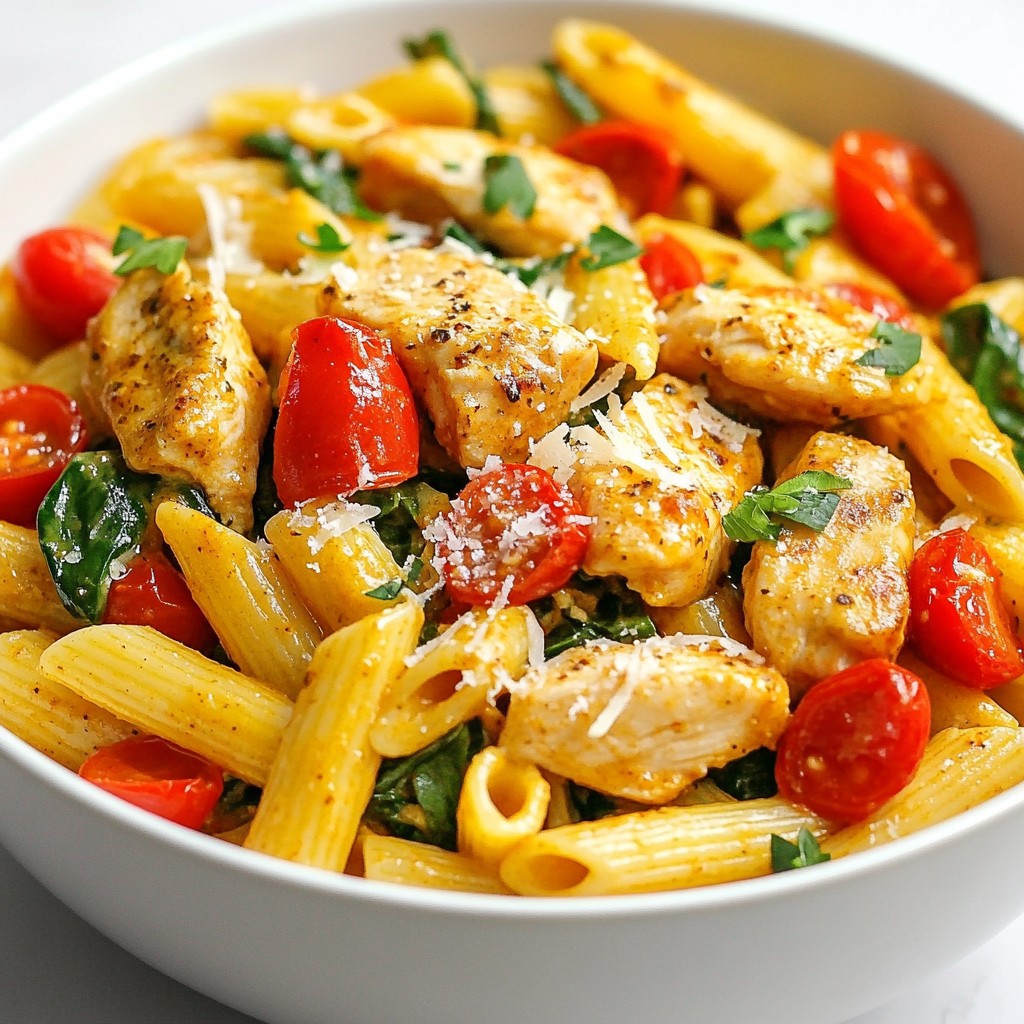If you’re looking for a quick, tasty meal, you’ve found it! This Lemon Herb Grilled Salmon recipe is simple yet bursting with flavor. I’ll guide you through easy steps to create a dish that impresses everyone at your table. With fresh ingredients and vibrant herbs, your grilled salmon will shine. Get ready to savor this delightful dish that’s sure to become your new favorite! Let’s dive in!
Ingredients
Main Ingredients
– 4 salmon fillets (about 6 oz each)
– 2 tablespoons olive oil
– Zest and juice of 1 lemon
Herbs and Seasonings
– 3 cloves garlic, minced
– 1 teaspoon fresh dill, chopped
– 1 teaspoon fresh parsley, chopped
– 1 teaspoon fresh thyme, chopped
– Salt and pepper to taste
Garnish
– Lemon wedges
– Fresh herbs for garnish
When choosing salmon, look for bright color and firm texture. Fresh salmon makes a big difference. The olive oil adds richness, while lemon brightens the dish. The zest gives a strong, fresh lemon flavor.
For herbs, fresh is best. They enhance the salmon’s taste. Garlic adds depth and aroma. Dill, parsley, and thyme complement the fish perfectly.
Finally, garnish your dish with lemon wedges and extra herbs. This adds beauty and fresh flavor.
Step-by-Step Instructions
Marinating the Salmon
– First, prepare the marinade. In a small bowl, whisk together:
– 2 tablespoons olive oil
– Zest and juice of 1 lemon
– 3 cloves garlic, minced
– 1 teaspoon fresh dill, chopped
– 1 teaspoon fresh parsley, chopped
– 1 teaspoon fresh thyme, chopped
– Salt and pepper to taste
This mix adds a bright flavor to the fish.
– Next, coat the salmon fillets in the marinade. Make sure to cover them well. Place the fillets in a shallow dish and pour the marinade over them. Cover the dish and refrigerate for at least 30 minutes. For more flavor, you can marinate them for up to 2 hours.
Grilling Preparation
– Now, it’s time to preheat the grill. Set it to medium-high heat. This helps the salmon cook evenly.
– Oil the grill grates to prevent sticking. You can use a paper towel soaked in oil or a grill spray. This step is key to keeping the salmon intact while grilling.
Cooking the Salmon
– Once the grill is hot, carefully place the salmon fillets on the grill, skin-side down. This helps protect the fish while it cooks.
– Grill the salmon for about 6 to 8 minutes. The cooking time depends on the thickness of the fillets. Check for doneness: the salmon should be opaque and flake easily with a fork.
– Flip the salmon halfway through cooking for nice grill marks. This also ensures even cooking.
– After grilling, remove the salmon from the grill. Let it rest for a couple of minutes. Resting allows the juices to settle, making the salmon more tender.
Tips & Tricks
Perfect Grilling Tips
Grilling salmon can be fun and simple. Here are some tips to make it perfect.
– Ideal grill temperature: Set your grill to medium-high heat. This gives you nice grill marks and helps the salmon cook evenly. Aim for about 375°F to 400°F.
– Timing for varying thicknesses: The cook time depends on how thick your salmon is. For fillets that are about one inch thick, grill for 6-8 minutes. Thicker fillets will need more time, around 10-12 minutes. Always check if the salmon flakes easily with a fork.
Flavor Enhancements
To make your grilled salmon even better, try these ideas.
– Adding other herbs or spices: You can mix in herbs like basil or cilantro for a twist. A pinch of paprika can also add a smoky taste. Experiment with what you like!
– Suggestions for citrus variations: Lemon is great, but don’t stop there! Try lime or orange juice for a fresh flavor. Citrus adds brightness and pairs well with the fish.
Alternative Cooking Methods
If grilling isn’t an option, you can still enjoy this dish.
– Oven-baking instructions: Preheat your oven to 400°F. Place the salmon on a lined baking sheet. Bake for about 12-15 minutes, or until it is cooked through and flakes easily.
– Stovetop options: Heat a non-stick skillet over medium heat. Add a bit of oil and cook the salmon for about 4-5 minutes on each side. This method gives a nice sear and keeps the salmon moist.
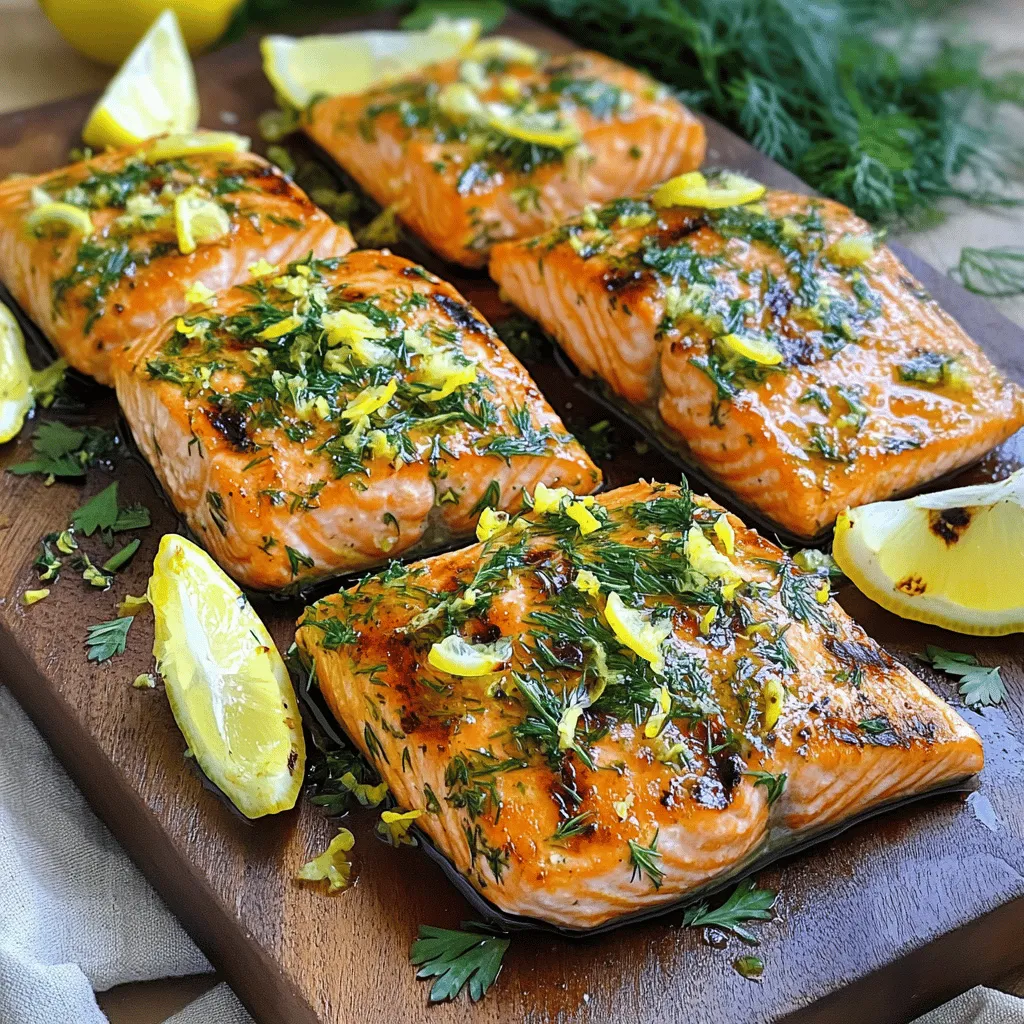
Variations
Different Marinades
You can change the flavor of your salmon with different marinades. One fun option is honey mustard. To make this, mix honey, Dijon mustard, and olive oil. This blend adds a sweet tang that pairs well with the fish.
Another great choice is a spicy chipotle version. Just add chipotle in adobo sauce to your olive oil and lemon juice. This will give your salmon a nice kick. Both of these marinades are easy to prepare and will excite your taste buds.
Salmon Alternatives
If you want to switch up the fish, you have many options. Try using trout or mackerel instead of salmon. Both have rich flavors and grill well. They can absorb the lemon herb marinade nicely, too.
For a vegetarian option, consider using portobello mushrooms. Their meaty texture makes them a great stand-in for fish. Marinate them just like the salmon and grill until tender. You will enjoy the smoky, herb-infused flavor.
Serving Suggestions
Pair your grilled salmon with tasty side dishes. Roasted vegetables or a fresh salad work well. You can also serve it with rice or quinoa for a heartier meal. These sides will complement the bright flavors of the salmon.
When it comes to drinks, consider a crisp white wine, like Sauvignon Blanc. Its acidity balances the richness of the salmon. For a non-alcoholic option, serve sparkling water with lemon. This keeps the meal refreshing and light.
Storage Info
Refrigeration Guidelines
To store leftover salmon, place it in a shallow dish. Cover it tightly with plastic wrap or foil. You can also use an airtight container for better freshness. Make sure to refrigerate the salmon within two hours of cooking. This keeps it safe and tasty. Leftover salmon lasts in the fridge for up to three days.
Freezing Instructions
You can freeze salmon both before and after cooking. If you freeze it raw, wrap each fillet in plastic wrap. Then, place them in a freezer bag. Be sure to remove as much air as possible. Frozen raw salmon can last up to three months.
If you freeze cooked salmon, let it cool first. Wrap it tightly in foil or plastic wrap. Place it in a freezer-safe bag. Cooked salmon also stays good for about three months.
When you’re ready to eat frozen salmon, thaw it in the fridge overnight. This helps keep the texture nice and smooth. For quicker thawing, you can use cold water. Just put the salmon in a sealed bag and submerge it in cold water for an hour.
Reheating Options
To reheat grilled salmon, you have a few good options. You can use the oven, stovetop, or microwave.
If using the oven, preheat it to 275°F (135°C). Place the salmon on a baking sheet. Cover it with foil to avoid drying out. Heat for about 15 minutes, or until warmed through.
If you prefer the stovetop, use a skillet over low heat. Add a splash of water or broth to keep it moist. Heat for about 5 minutes, flipping halfway through.
For the microwave, place the salmon on a microwave-safe plate. Cover it with a damp paper towel. Heat in short bursts of 30 seconds to avoid overcooking.
No matter how you reheat, check for dryness. Keeping it moist is key to enjoying your leftover salmon.
FAQs
How long should I marinate the salmon?
I recommend marinating the salmon for at least 30 minutes. This time allows the flavors to soak in. You can marinate it for up to 2 hours if you want a stronger taste. Just don’t go over 2 hours, as the acid from the lemon can make the fish mushy.
What temperature should salmon be grilled to?
Grilled salmon should reach an internal temperature of 145°F. This ensures the fish is safe to eat and still moist. You can use a meat thermometer to check the temperature. When it flakes easily with a fork, it is likely ready.
Can I use frozen salmon?
Yes, you can use frozen salmon. However, it is best to thaw it before grilling. Cooking frozen salmon directly can lead to uneven cooking. To thaw, place it in the refrigerator overnight. If you are short on time, you can run it under cold water for about 30 minutes. Make sure to pat it dry before marinating and grilling.
You now know how to grill salmon perfectly. We covered key ingredients, marinade tips, and cooking methods. I shared ways to elevate your salmon’s flavor and explore variations. You learned proper storage to keep leftovers tasty. With these steps, you can enjoy delicious grilled salmon any time. Enjoy experimenting with new flavors and techniques. Happy cooking!
